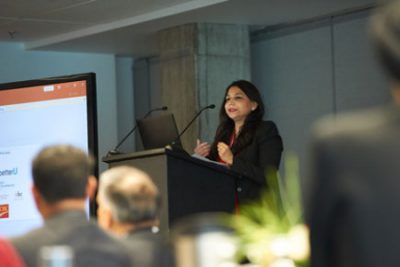By Dan Rubinstein
Photos by Josh Hotz
 Female technology entrepreneurs in Canada and India can play a key role in the growing and increasingly important economic relationship between the two countries.
Female technology entrepreneurs in Canada and India can play a key role in the growing and increasingly important economic relationship between the two countries.
India’s economy is expanding at a tremendous rate and Canadian companies want to diversify their international markets, which creates an opening for traditionally under-represented enterprises in terms of sector and leadership.
That was one of the messages shared at Canada-India: The Road Ahead, a day of panel discussions and networking hosted by Carleton University’s Canada-India Centre for Excellence (CICE) on June 4 to explore investment opportunities in the two countries.
The event, which brought together government and diplomatic officials, academic researchers and businesspeople, including a delegation of more than 50 companies visiting from India, also served as the official launch of Carleton’s Canada-India Accelerator Program (CIAP).
The CIAP will provide seed funding, access to business incubation services, mentorship from seasoned entrepreneurs, connections to large corporations and other supports for 100 women-led technology startups — 50 from each country — over the next five years.
The program was announced last February by Navdeep Bains, federal Minister of Innovation, Science and Economic Development, and is a partnership between the CICE and the All India Council for Technical Education (AICTE), India’s national regulator for a network of 10,500 colleges and institutes.
“Canadian women entrepreneurs in tech need to understand what’s available to them in India,” said Janice McDonald, an award-winning serial entrepreneur and president of Ottawa-based business management consultancy The Beacon Agency.
“It’s an amazing opportunity, and the Government of Canada has signalled in a really strong way that we want to have everybody in the game and playing. We don’t want to leave 50 per cent of people on the bench. So, we need to ensure that women get the support they need, such as strong networks and mentorship.”
McDonald was speaking at The Road Ahead as part of a panel on female entrepreneurship moderated by Kasi Rao, president of the Canada-India Business Council, who noted that “the Canadian brand is a powerful emerging brand,” especially considering trade uncertainty in the era of Brexit and U.S. President Donald Trump’s protectionist policies.
To take advantage of Canada’s momentum, “women need to ensure that they have a robust network,” said McDonald, “and can find the information they need to grow their businesses.”
Once they establish connections in India, female-led Canadian tech start-ups will experience a business culture that’s more receptive than ever before.
“The glass ceiling is breaking quickly in India,” said Nadira Hamid, CEO of the Indo-Canadian Business Chamber and one of McDonald’s co-panelists.
More and more companies are opening onsite child-care centres, she said, and men are “adjusting” and becoming more accustomed to working for female leaders.
“These steps are enabling women to remain in business and reach senior levels,” said Hamid, and at the same time they are creating a climate that’s more welcoming to foreign women.
“E-commerce has definitely opened doors,” added fellow panelist Seema Aurora, president and CEO of Ottawa’s TAG HR, “but it’s still necessary to ensure that you’re following the right business steps, to ensure that you’re delivering what you’ve promised and that you’re getting what you’ve asked for.
“Women entrepreneurs tend to give up early, and we have to encourage them — to remind them that everybody fails, that you need to get up and dust yourself off, and that hopefully you will have learned from that experience.”
The Road Ahead featured distinguished guests such as Vikas Swarup, the High Commissioner of India to Canada, and Jordan Reeves, the Mumbai-based Consul General of Canada to India, as well as Ottawa Mayor Jim Watson.
“India has transformed at a dizzying pace over the last five years,” said Swarup. “People in Canada might have in mind the India of the 1990s.
“Big business will always find its level. It knows how to navigate the markets. But small- and medium-sized enterprises are often not even aware of the opportunities that exist. Canada should focus much more strongly on India than it has so far. Canada needs to bring India to the centre as an export market. India is still in the periphery.”
“We’re a little jaded,” said Reeves, who has been in Mumbai for the past three years after spending a decade in China. “The world has seen China rise and we’re not giving India as much attention as we should
“Canadian companies are being out-competed by Asian companies, which have financing from their home countries. We haven’t found the right formula in Canada yet to support our companies so they can go after business in India.”
“I had the honour of leading the first-ever municipal delegation from Ottawa to India two years ago,” said Watson. “Our delegation represented the hi-tech and clean-tech sectors as well as other industries, business and tourism associations, and the academic sector. In particular, what struck me was the thirst for more information on clean-tech — a burgeoning sector in Ottawa and one that fits well with India’s need to address clean water and air issues.
“It was a very good start,” Watson said about the trade mission to India. “It was something that should have been done a long time ago.
“The City of Ottawa and our economic development agency Invest Ottawa are focused on India because it represents an important and growing market for our city,” he added. “Institutions like Carleton and the Canada-India Centre for Excellence represent an effective way to strengthen the Canada-India partnership.”
The Road Ahead also provided a forum for speakers such as Gavin Armstrong, founder and CEO of Lucky Iron Fish, established in Guelph, Ont., in collaboration with Carleton Interim President Alastair Summerlee.
The Canadian social enterprise is working to spread an affordable palm-sized iron product, shaped like the kantrop fish throughout much of the world, but like a leaf in heavily vegetarian India, that can be added to cooking pots to address the devastating impact of iron deficiency and anemia which predominantly affect children and women in counties such as India, hindering their cognitive development and productivity.
Boiling a Lucky Iron Fish — or Leaf — in a cooking pot for 10 minutes provides a person’s daily iron needs without changing the taste, colour or smell of food.
“We need a simple solution to this complex global problem,” said Armstrong, explaining that the product, which is manufactured in Bowmanville, Ont., and Pune, India, costs less than $10 for five years of household use and has a compliance rate of more than 90 per cent. That compares with $670 for five years of iron supplement pills for a family — an approach that has side effects and a compliance rate below 30 per cent.
Goldy Hyder, president and CEO of Hill + Knowlton Strategies, was another featured speaker at The Road Ahead, gearing his remarks to the Indian businesspeople in attendance and noting that “there has never been a better time for India to invest in Canada.”
The event, which included panels on investment, real estate and educational connections between the two countries, was introduced by Summerlee, Carleton Vice-President (Research and International), Rafik Goubran, and Pradeep Merchant, a member of the CICE governing council and Carleton’s Board of Governors.
“A stronger Canada-India partnership holds the promise of greater prosperity and security for both countries,” said Merchant, noting that the Indian economy will comprise 10 per cent of the global economy within 15 years and that the large Indian diaspora in Canada helps to link the two cultures.
“We need to create the right investment climate through sound policies and strategies,” said Merchant. “There are opportunities in sectors ranging from urban planning and agriculture to health care, natural resource, and technology. Canadians who fail to appreciate the economic opportunities in India do so at their own risk.”
Tuesday, June 5, 2018 in Campus News
Share: Twitter, Facebook



